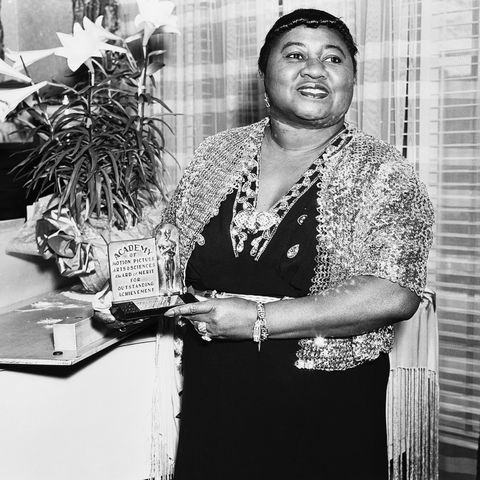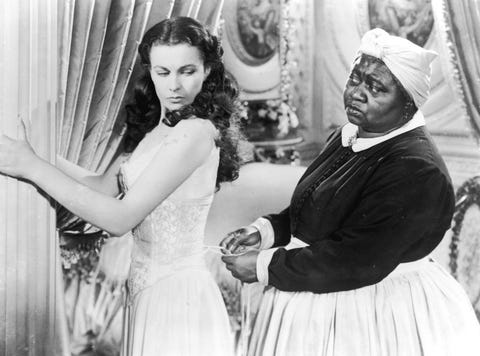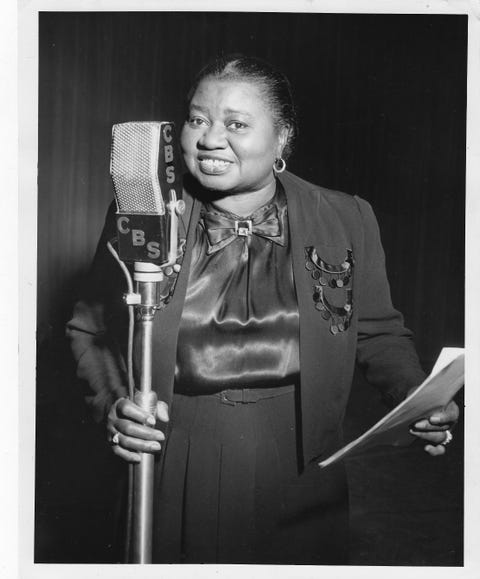
John Kobal FoundationGetty Images
In Netflix's new series Hollywood, creator Ryan Murphy turns Tinseltown on its head, reimagining what a more diverse and inclusive entertainment industry would have looked like in the era after World War II. Though most of the characters and storylines are fictional, some represent real-life pioneers of Hollywood, like Hattie McDaniel, the first Black person to win an Oscar.
Portrayed by Queen Latifah, McDaniel was a natural performer with a penchant for singing and songwriting, as well as acting. Her Academy Award win for her Gone with the Wind performance marked the first time that a Black person won the prestigious accolade (it would be another two decades before another Black person would win the award). Read on to learn more about her life and career.
She started her career in entertainment by touring in a troupe.
McDaniel was the youngest daughter of two freed slaves. Early in her career, she followed her older brother, Sam, as a performer in his traveling comedy troupe, before ultimately moving to Los Angeles. There, she made ends meet working as a maid or a cook while she pursued a career in film and radio from the 1920s to the 1930s.
When she scored an audition for the role of Mammy in Gone with the Wind, accounts at the time say she arrived dressed in an authentic maid's uniform, ultimately winning the part outright.
One February afternoon in 1940, McDaniel strolled into the office of producer David O. Selznick and placed a stack of raving Gone with the Wind reviews on his desk, according to The Hollywood Reporter. (At the time, the Los Angeles Times said her performance as Mammy was "worthy of Academy supporting awards.") Selznick submitted the actress for the Best Supporting Actress category, where she ultimately clinched a nomination and the honor.
She was forced to sit away from the rest of her fellow cast members when she won the prestigious award.
The 12th annual Academy Awards took place at The Ambassador Hotel, which had a strict "no-blacks" policy at the time, according to THR. Subsequently, when McDaniel arrived, she was escorted away from the Gone with the Wind table and had to instead sit at "a small table set against a far wall," where she was joined by her escort and her white agent.
Despite the blatant injustice, McDaniel delivered an emotional acceptance speech. "This is one of the happiest moments of my life," she told the crowded room. "I want to thank each one of you who had a part in selecting me for one of the awards. For your kindness, it has made me feel very, very humble and I shall always hold it as a beacon for anything I may be able to do in the future. I sincerely hope that I shall always be a credit to my race and the motion picture industry. My heart is too full to tell you how I feel."
After McDaniel's death in 1952, her Oscar Award (winners of the supporting actor categories were gives gold plaques, rather than figurines) went missing. McDaniel had originally donated the plaque to Howard University in Washington, D.C., where it was displayed at the fine arts complex. By the early 1970s, it became apparent that the award had gone missing. Its whereabouts are still unknown.
"The understanding that I've developed has been that it was probably in the late 1960s or early 1970s—or perhaps during a period of student unrest at the university," Thomas Battle, the then-director of Moorland-Spingarn Research Center at Howard, told NPR in 2009. "But unfortunately all of the principals who would have been involved at the university at that time—administrators and others—are no longer with us, and we have not been able to get the kind of direct information that we would like to be able to pursue this investigation further."
After McDaniel's Oscar win, Hollywood continued to pigeonhole her into roles playing the servant archetype.
Her Academy Award achievement may have been hailed as a step forward in achieving racial equity in Hollywood, but McDaniel was also hotly criticized for continuing to play subservient roles throughout the course of her career (she reportedly played a maid 74 times).
Aware of the criticism, McDaniel once said of her work, "I'd rather play a maid and make $700 a week than be a maid and make $7."
After continuing to get disappointing roles in film, McDaniel's career pivoted toward radio. She broke records again when she became the first Black woman to star in her own radio show, after taking over from Bob Corley, a white voice actor, for the radio comedy series Beulah. She was eventually cast in the TV version of the series, but was soon replaced once she was diagnosed with breast cancer and became too ill to continue working.
McDaniel died in 1952 at 57 years old.
"Hollywood" - Google News
May 06, 2020 at 06:03AM
https://ift.tt/2A6RP0N
Who Was Hattie McDaniel? - Hollywood Hattie McDaniel Oscar Win True Story - HarpersBAZAAR.com
"Hollywood" - Google News
https://ift.tt/38iWBEK
https://ift.tt/3fdiOHW
Bagikan Berita Ini
















0 Response to "Who Was Hattie McDaniel? - Hollywood Hattie McDaniel Oscar Win True Story - HarpersBAZAAR.com"
Post a Comment